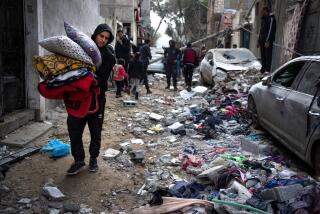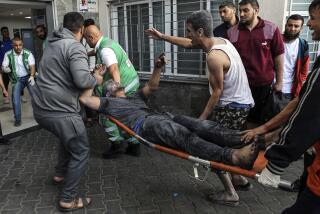First, Bombs; Then, Reform
- Share via
The military campaign in Afghanistan has begun, the first and indispensable stage of getting at the one essential target, Osama Bin Laden and his chief lieutenants. A final military phase will probably entail strikes against any centers or bases of guerrilla-terrorist groups that operate against Kashmir and Uzbekistan.
There are big pitfalls in the present military stage in Afghanistan. First, the conservative religious opposition movements inside Pakistan could react violently and even threaten the regime’s stability. Second, many military officers inside Pakistan hold Islamist views and sympathies with the Taliban and could move against Pakistan President Gen. Pervez Musharraf. Many moderate officers still see the collapse of the Taliban as the destruction of a friendly strategic ally on their western flank, weakening Pakistan vis-a-vis India.
Yet the administration has so far wisely handled Pakistan with carrots as well as sticks, and Musharraf himself has warned the Pakistani public that the Taliban regime has fatally damaged itself through noncooperation on Bin Laden.
It is now probable that Pakistan can weather this crisis as long as the U.S. and British military campaign inside Afghanistan does not go on for too long and that casualties among the Afghan population are not excessive or graphic in the media. The Arab world would probably remain relatively stable as long as the campaign is limited to Afghanistan.
In the end, however, Afghanistan may end up representing the sole military phase of the broader war against terrorism. After dealing with Bin Laden, the going gets a lot tougher--not in any military sense but in diplomatic terms.
The reason: Subsequent stages of an anti-terrorist campaign mostly entail combating Lebanese and Palestinian guerrilla groups about which both Arab regimes and publics are sensitive, and that could threaten the longer-term cohesion of the coalition.
The administration has carefully defined the chief targets as terrorist organizations with international reach, which largely excludes Palestinian groups. Indeed it is quite striking that Palestinians have figured very slightly in overall Bin Laden operations against U.S. interests.
Furthermore, much of the Muslim world views any U.S. attacks on Palestinian guerrillas as tantamount to a disarming of the Palestinians in their struggle with Israel, leaving them then helpless in the face of the coercive power of the Israeli state and its military.
Clearly, deep moral ambiguities are involved here. Practical questions exist as well: The U.S. is no more able than Israel to eliminate Palestinian guerrilla forces militarily. So subsequent stages of the campaign against terrorism will most likely be focused on intelligence, police work and international cooperation.
Bush’s strategy against Iraq remains a key question. Arguably Saddam Hussein’s regime is the worst in the world. Yet there is little evidence of serious links between Baghdad and Bin Laden, so it is difficult to renew military assaults against Hussein as part of the war on terrorism. It would overload the circuits in the Arab world among regimes and peoples. Baghdad will have to take a back seat for some time, pending the results of the rest of the campaign.
The actions that the U.S. has embarked on, if handled wisely and successfully, could make a significant dent in the ability of international terrorists to operate across borders. The long-range task then emerges, which is the most daunting of all: dealing with the deeper roots and causes of terrorism.
In the end, the broad international feeling across much of the world--that the deaths of innocents in the Sept. 11 attacks were tragic but that the U.S. in a way “had it coming”--is more frightening than the actual attacks themselves. These are the deepest sources of discontent that must be dealt with. A hard-line security agenda must give way to an more “liberal” agenda that focuses on regime reform, political liberalization and even a U.S. foreign policy that would be perceived as more sensitive to the interests of other states and less single-minded in pursuit of America’s interests exclusively.
More to Read
Sign up for Essential California
The most important California stories and recommendations in your inbox every morning.
You may occasionally receive promotional content from the Los Angeles Times.













